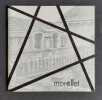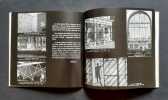MORELLET (François) -
Morellet -
texte de présentation par l'historien d'art Gilles Gheeerbrant. Arles : catalogue de l'exposition des salles romanes du cloître Saint-Trophime, juillet/septembre 1978. Un volume agraphé (24x24 cm), (44) pages + un calque en double page. Reproduction des oeuvres et photographies des installations en noir. Bon état.
Reference : 41295
Bookseller's contact details
Le Livre à Venir
Mme et Mr. Florine et Richard Jaillet
41 Place de l'Oscambre
03140 Chantelle
France
06 44 78 76 58
Payment mode
Sale conditions
Règlement accepté : chèque, paypal, virement bancaire ou mandat. Nous garantissons l'état de nos livres conformes à la description donnée sur nos notices. Envoi de photographies sur demande. Les prix indiqués sont nets, port en sus à la charge de l'acquéreur. A réception de votre commande, vous recevrez une demande de règlement détaillée. Nous envoyons les ouvrages dans un délai de trois jours maximum, à réception de votre règlement par chèque,paypal, espèces ou virement bancaire. <br />
5 book(s) with the same title
Mémoire sur la situation actuelle de la Compagnie des Indes; par M. l'Abbé Morellet. Seconde édition. Se trouve à Paris, chez Desaint, 1769. With 1 engraved folding table. - (Followed by:) (NECKER, J.) Réponse au Mémoire de M. l'Abbé Morellet, sur la Compagnie des Indes, Imprimèe en exécution de la Délibération de M.rs les Actionnaires, prise dans l'Assemblée générale du 8 Août 1769. A Paris, De l'Imprimerie Royale, 1769. - (Followed by:) (MORELLET, A.) Examen de la réponse de M. N** au mémoire de M. l'Abbé Morellet, sur la Compagnie des Indes; par l'Auteur du Mémoire. Septembre 1769.
Se trouve à Paris, Chez Desaint, 1769. Three volumes. [2], 260, xxvi, [2] pp.; [2], 50 pp.; [4], 151, [1] pp. 4to. Contemporary marbled paper covers, a bit worn, an uncut copy. First work: Kress 6662; Einaudi 4023; Higgs 4700n; INED 3306; Goldsmiths' 10546; Sabin 50596. Second, enlarged and best edition of the work, first published in the same year. "This controversy took place when the affairs of the French East India Company were in the most disordered state possible. Morellet, who contended for the abolition of the Company and the opening of the trade, had a decided advantage over his oponent (Necker), who appeared as the defender of the Company. The controversy was terminated by government adopting the suggestions of Morellet. The latter, indeed, had been invited to write his first Mémoire by M. d'Invaux, then Comptroller-general; and on the accession of Turgot to the ministry, he received a pension of 2000 livres a year for his services on this occasion" (McCulloch, p. 114-115).Morellet, by conviction a persistent supporter of free trade, here gives a succint history of the Compagnie des Indes and shows how the directors were benefitting to the detriment of the state. The privileges of the Compagnie des Indes were suspended on August 13, 1769.The supplementary xxvi pages at the end contain various texts further documenting Morellet's arguments, among which a text by Gournay, covering the pages x-xxvi and which is entitled: "Observations sur le rapport fait à M. le Contrôleur-Général, par M. de S*** le 26 juin 1755, sur l'état de le Compagnie des Indes; par feu M. de Gournay, Intendant du Commerce."Second work: Kress 6665; INED 3370; Higgs 4701; Sabin 52216; McCulloch, p. 114-115; not in Einaudi; not in Goldsmiths'.First edition.Necker replied to Morellet's Mémoire with the present work in August 1769 pointing out that the Compagnie was an institution created by the state, for state interests rather than for the interests of the stockholders. The state, after the reorganization of 1725, completely dominated its operations. Funds granted by the king to the company were neither controlled by the stockholders nor granted for their particular interest. These funds were used for the goals of the state, either for warfare or for expenditures that were properly those of the sovereign, not of a commercial company. Necker furthermore argued that the company's commerce in the Indies had always been profitable except during the Seven Years' War.Third work: Kress 6660; Einaudi 4021; Higgs 4702; INED 3300; Goldsmiths' 10543; Sabin 50595.First edition.Morellet's response to Necker. Morellet was in no doubt employed to make out a particular case (see the note to the first text), but in none of the contemporary replies to his pamphlet is any serious argument found to discredit his chief facts: that a commercial company which is not self-supporting ought to be abandoned and that there are more important uses to which the public revenue can be put than in maintaining a company which is bankrupt if left to itself (see: Cambridge Modern History, vol. vi, pp. 549-550).Loosely added to these three volumes:ARRET du Conseil d'État du Roi, Concernant le Commerce de l'Inde. Du 13 août 1769. Paris, De l'Imprimerie Royale, 1769. 4 pp. 4to. Disbound.This is the original edition of the important royal edict terminating the activities of the Compagnie des Indes (see note to the first work)EXAMEN des décisions de M. l'Abbé Morelet (sic), sur les trois Questions importantes qui sont le sujet de son Mémoire. No place, no date. 40 pp. 4to. Side-stitched, uncut.Conlon 69:224.Anonymous text strongly refuting the opinions of Morellet.Very nice and good volumes, rather large with ample margins (270 x 220 mm.)


(NVVA, )
Phone number : 31 20 698 13 75
Traité des Délits et des Peines. Traduit de l'italien [par l'abbé Morellet], d'après la troisième Edition, revue, corrigée et augmentée par l'Auteur. Avec des Additions de l'Auteur, qui n'ont pas encore paru en italien.
1766 In-12 (166 x 96 mm) demi-basane marbrée à coins de l'époque, dos lisse orné de compartiments garnis de doubles filets dorés en place de nerfs et fleuron répété au centre, pièce de titre de veau bordeaux, tranches mouchetées, xxxj, (1) bl., 286 p. Lausanne [i.e. Paris], 1766.
Véritable première édition de premier tirage de cette traduction française donnée par l'abbé Morellet, publiée à Paris à partir du 28 décembre 1765 sous l'adresse fictive de Lausanne.Cette traduction, effectuée à la demande de d'Alembert, fut rééditée à deux autres reprises en cette même année 1766, sous les adresses de Philadelphie et d'Amsterdam.Les corrections et ajouts mentionnés sur la page de titre avaient été préparés par Beccaria pour une nouvelle édition italienne et transmis à Morellet pour cette traduction qui obtint les félicitations de l'auteur."La clarté philosophique, la dénonciation de l'arbitraire et le réquisitoire contre la torture et la peine de mort valurent à cet ouvrage une notoriété exceptionnelle par les penseurs et les hommes d'État" (cf. 'Diderot et son temps', n° 176). L'un des livres emblématiques des Lumières européennes; "one of the most influential books in the whole history of criminology" (PMM, n°209).(Bengesco, 'Voltaire', II, 175. Camus-Dupin, n° 371. J. Pandolfi, 'Beccaria traduit par Morellet', in "Dix-Huitième Siècle", 1977, IX, p. 291-316).Trace de restauration aux mors. Quelques brunissures éparses.Bon exemplaire, relié à l'époque.


Phone number : 33 01 47 07 40 60
Mémoires de l'Abbé Morellet, ...., sur le dix-huitième siècle et sur la Révolution; précédés de l'éloge de l'abbé Morellet par M. Lemontey.
Paris, A la librairie Française de Ladvocat, Palais-Royal, 1821. With engraved portrait and 2 plates. 2 volumes. (4), viii, xxxii, 384 pp; (4), 444, iv pp. 8vo. Contemporary half calf, marbled boards, spines gilt in compartments, green labels with gilt numbering and lettering, marbled edges. Goldsmiths 23119; Cabeen 93; cf.: Kress C.1616 (1822 edition only); cf.: Einaudi 4022 (1822 edition only); cf.: INED 3307 (1822 edition only); Tulard, 1064; not in Mattioli. First edition. 'De précieux renseignements sur la société du Consulat, le rétablissement de l'Académie française et la formation des listes de notabilités dans le dernier volume' (Tulard). Includes details on important 18th-century men such as Buffon, Caraccioli, Condillac, Condorcet, d'Alembert, Benjamin Franklin, d'Holbach, Diderot, Helvétius, Hume, La Condamine, Lavoisier, Malesherbes, Marmontel, Necker, Raynal, Rousseau, Turgot, Voltaire, etc. The 2 plates in volume 1 reproduce drawings by Benjamin Franklin. The second volume is complete with the double pages 443-444, giving a list of unpublished manuscripts by Morellet.


(NVVA, )
Phone number : 31 20 698 13 75
Mémoires sur le dix-huitième siècle et sur la Révolution. précédés de l'éloge de l'abbé Morellet, par M. Lémontey
Paris, Ladvocat, 1822 2 vol. in-8, (10)-XIX-472 pp. et 516 pp., portrait-frontispice au tome I, basane fauve, dos lisse orné, chaînettte dorée en encadrement sur les plats (reliure de l'époque). Mouillure en marge du tome 2, pet. manques aux coiffes du tome 1,coins usés dont un manquant, qqs épid. sur les plats.
"Les mémoires de Morellet donnent de précieuses indications sur la façon dont la Révolution a été perçue dans les milieux littéraires et académiques. Bien au fait des événements politiques, ils sont aussi utiles sur bien des points concernant les bouleversements révolutionnaires." (Fierro, 1076).Tulard, 1064 : "De précieux renseignements sur la société du Consulat, le rétablissement de l'Académie Française et la formation des listes de notabilité dans le dernier volume." - - VENTE PAR CORRESPONDANCE UNIQUEMENT
François Morellet sculpteur 1949-1990 -
Catalogue de l'exposition présentée au Musée des Beaux-Arts de Calais de septembre à décembre 1990 - Textes de Bernard Marcadé, Patrick Le Nouëne et François Morellet - un volume 24,5x27cm broché sous couverture illustrée, de 97 pages sur papier couché illustrées de 44 oeuvres - Joints un carton d'invitation à la galerie Liliane & Michel Durand-Dessert à Paris en septembre 1989 + 2 cartes et un article de presse - bon état -
 Write to the booksellers
Write to the booksellers




